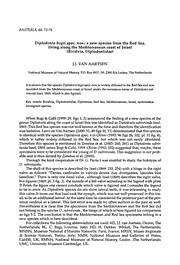
Diplodonta bogii spec, nov.: a new species from the Red Sea, living along the Mediterranean coast of Israel (Bivalvia, Diplodontidae) PDF
Preview Diplodonta bogii spec, nov.: a new species from the Red Sea, living along the Mediterranean coast of Israel (Bivalvia, Diplodontidae)
BASTERIA, 68: 73-76 Diplodonta bogii spec, nov.: a new species from theRed Sea, living along the Mediterraneancoastof Israel (Bivalvia, Diplodontidae) J.J. vanAartsen National Museum ofNaturalHistory, P.O.Box 9517, NL 2300RALeiden,The Netherlands ItisshownthatthespeciesDiplodontabogiispec.nov.is widelydiffused intheRedSeaandwas recorded from the Mediterranean coast ofIsraelunder the erroneousnameofDiplodontasub- rotunda Issel, 1869,which isalso figured. Key words: Bivalvia,Diplodontidae,Diplodonta, Red Sea,Mediterranean,Israel,systematics, immigrantspecies. WhenBogi &Galil (1999:29, figs 1,2)announcedthefinding ofanew speciesofthe genusDiplodonta alongthecoastofIsraelthiswas identifiedasDiplodonta subrotunda Issel, 1869.ThisRedSeaspecies wasnotwellknown atthetimeandthereforetheidentification wastentative.LateronVanAartsen(2000:51,49figs 10,11)demonstratedthatthisspecies is identicalwiththespeciesDiplodonta spec.4inOliver (1992:96figs 26,102,pi. 21 fig.4), which is rather widely diffusedin the Red Sea, but which was not easily identified. DThereforethiis sppecies is mlenotionedindZenetosoetal. (200n3: 260, 26t1)asa subro- tundaIssel, 1869,sensu Bogi & Galil, 1999. Oliver(1992:102)suggested that,maybe, these specimens weretobe consideredtheyoungof D. subrotunda.Thissuggestion is notprob- ableand is thusdeniedbyZenetosetal.(2003). Through thekindcooperation of Dr.G. Pavia Iwas enabledtostudy theholotype of D. subrotunda. The shellof thisspecies is describedby Issel (1869:253,254)withahinge in theright valve as follows: "Dentes cardinales in valvula dextra duo divergentes, laterales bini lamellosi."There is only onefossil valve,although Issel (1869) describestheright valve, but figures (1869:pi.3fig.2) theoutsideofaleftvalveaccording tothelegend withplate 3! Fromthefigure onecannot concludewhichvalveis figured andI considerthelegend to bein error. AsDiplodonta species donot show lateralteeth, itwasinteresting tostudy this valve.Itturns outthatIsseltookthenymph, whichwasnotwellpreserved in thisfos- sil, tobeanadditionallateral.Atthesametime heconsideredtheposteriorpartofthepos- terior cardinalasalateral.Thislast errorwas madeby otherauthors in thepast aswell. Nevertheless itis clear that thespecimens from theMediterraneanand theRed Seadid not belong tothespecies D. subrotunda, thehingeofwhichisherefigured forcomparison as figs 1-2. Theconclusionis thattheMediterraneanandRed Seaspecimens belong toa new species whichis heredescribed. Forcollectionsthefollowing abbreviationsareused:AD, J.J. vanAartsen,Dieren,The Netherlands; BL, C. Bogi, Livorno, Italy; HD, H. Dekker, Winkel, The Netherlands; MNHN,Museum National d'HistoireNaturelle,Paris, France; MRSN, MuseoRegionale di Scienze Naturali, Torino, Italy; NMW, National Museum and Galleries of Wales, Cardiff, UK; RMNH, National Museum of Natural History, Leiden ,The Netherlands; UMC,University Museum Cambridge, UK. 74 BASTERIA, Vol. 68,No. 4-6, 2004 Additionalabbreviations:p,paired valves; v, valve. Diplodonta bogii spec.nov.(figs 3,4) DiplodontatumidaH.Adams [inpart.?];Lamy, 1916: 189. DiplodontatumidaH.Adams;Moazzo,1939:93. Diplodontaspec.;Oliver, 1992:96, textfig.26,pi.21 fig.4. Diplodontaspec.;Hoenselaar &Dekker, 1998: 205. Diplodontasubrotunda Issel; Bogi&Galil,1999:29, figs1,2. Diplodontatumida (H.Adams);Dekker&Orlin,2000:11. Diplodonta subrotundasensuBogi&Galil;VanAartsen,2001:51, 49 figs 10,11 Diplodontaravayensis[sic] Sturany; Zuschin &Oliver,2003:110,figs26.3-5. Diplodontacf. subrotundaIssel;Zenetos etal., 2003: 260,fig. NotPhlyctidermatumida(H.Adams);Oliver, 1992:102,pi.21 fig. 5.Astudyofthefiguredspecimenshows ittobelongtoMysia (Lajonkairia)elegans(H. Adams,1871);thereis asyntype(BMNH 1871.3.22.11) whichwasstudied too. Material(holotypeand paratypes). - Egypt: ZeitBay (NMW 1984.071.00004/1v[= Oliver,1992,pi. 21 fig.4]);Suez (NMW 1955.158.11402/1v; MNHN/1p& 13v);Great BitterLake (RMNH43894-43909, exColin Beets[SeeBeets, 1953],sta.GB.05/7v,GB.08/5v, GB.09/2v,GB.10/7v +(holotypeRMNH 99414), GB.14/7v, GB.18/2v, GB.19/4v, GB.24/lp+lv, GB.25/2v, GB.26/2v, GB.28/lp+5v, GB.29/2v, GB.33/3v, GB.35/8v,GB.45/3v,GB.46/lv);GreatBitterLake,HD 17112p, HD 1712lp+lvleg.C.Beets, 1950.Djibouti (MNHN/7v).SaudiArabia: Musselamiwah Bay (NMW 1992.001.00014/2v).Yemen: Aden(MNHN/10v). RedSea: (UMC/7p).Israel,Mediterranean coast:BL4p+10v(+manyjuveniles),AD18098A2p+5v(juv). Description. - Shell nearly round and rathertumid.The outer surfaceonly shows somegrowth-lines butno realsculpture canbe detected.Thehinge consistsoftwo diver- gentcardinals, theanterior in theleftvalveand theposterior in theright valveare split into two equal parts. There are no laterals. The ligament is wholly internal and there seems tobe no nymph. Thelargest specimen is 10* 9 mm. The holotype measures 8><7 mm. Differentiation.- Thenewspecies differsfrom D. subrotundainanumberofcharac- ters. Mostimportant is thepresence ofanymph fortheexternalligament inD. subrotun- da whereasin D. bogii such afeature is notpresentand theligament seems tobe wholly internal. Secondly,thenewspecies reaches amaximumdimensionofabout 10mmwhere- as Dsubrotundareaches morethan doublethat dimension.Thirdly, it is notedthatin D. subrotundathehinge-plate is clearlydifferentiatedfromtheanteriordorsalmarginwhere- as thehinge-platelies in thesame plane as theshell margin inD. bogii (compare figs 1-2 with figs 3-4) . Thepresentspecies is undoubtedly citedin theliteratureunderthenameDiplodonta tMumida (H. Adams, 1871). Hoywever,Adams (s1871:791,792, pii. 48 figa.16) described tumidaas " M.testaoblique rotundata, tenui,inequilaterali, striolis confertisradiantibus et concentricis obsolete decussata; umbonibus antemedianis, tumidis, prominentibus; regione postica paulum latiore; margine ventralioblique arcuato. Long. 12,alt. 11, lat.8 mill."Neitherthesculpture (radial as wellasconcentric), thedimensionsnorthepromi- nent umbonescanbeapplied toD. bogii spec.nov. ThereforeAdams's namecannot beaccepted forthisspecies, notwithstanding thefact that specimens of D. bogii of 6 to 7 mm are present in the M'Andrew collection in Cambridge, fromwherethespecies Mysia tumida was described. Van Aartsen: Diplodonta bogii spec. Nov. 75 Figs 1-2.DiplodontasubrotundaIssel, 1869.SpecimenfromEgypt,GreatBitterLake, RMNH(excolln C. Beets), height 12mm. 1. Leftvalve hinge.2 Right valve hinge. Note remains ofligamentfastened to nymph. Figs3-4. Diplodontabogii spec. nov.HolotypefromEgypt, GreatBitterLake,RMNH (excolln C.Beets), height7mm. 3.Leftvalveinside. 4.Right valveinside. Note absenceofnymph. ACKNOWLEDGEMENTS The helpof Dr G. Pavia (MRSN), Mrs V.Heros and Dr Ph. Bouchet (MNHN),Mrs A.H. Wood and Dr P.G. Oliver (NMW) as well as Dr R. Preece (UMC) is gratefully acknowledged. Thephotographs werekindlymadeby J.Goud(RMNH). 76 BASTERIA, Vol.68, No. 4-6, 2004 REFERENCES AARTDSEN, J.J.van,i2000.pEuropeanmlarinoeMollusca:dNotesonleosswell-knownn species. tXVI. a eddystonia(Marshall,1895),with notesonthe otherEuropeanDiplodontaspecies. — La Conchiglia 32(297):46-51,60-61. ADAMS,H., 1871. Descriptionsoftwenty-six newspeciesofshells collected byRobertM'Andrew,Esq., inthe RedSea.-Proceedings oftheZoologicalSociety ofLondon (1870):788-793. BEETS, C., 1953. Notes on the dredgingin the Great Bitter Lake ofthe Suez Canal. — Zoologische Mededelingen,Leiden 32: 97-106 BOGI,C.,&B.S.GALIL, 1999.New findingsalongthe Israeli coast. — LaConchiglia31(292):29-32. DEKKER, H.,& Z.ORLIN,2000.Check-list ofRed SeaMollusca. —Spirula47(supplement):1-46. HOENSELAAR, H. J., & H. DEKKER, 1998. Molluscs oftheGreatBitterLake,Suez Canal, Egypt, col- lected by C.Beetsin 1950. — Basteria62:197-214. ISSEL, A., 1869. Malacologia del Mar Rosso, ricerche zoologiche e paleontologiche. Biblioteca Malacologica.:i-xi, 1-387.Pisa. LAMY,E.,1916.Les lucinesetlesdiplodontesdela MerRouge(d'apreslesmateriaux recueillis par M.le Dr Jousseaume).— Bulletin duMuseum d'Histoirenaturelle,Paris 22(4): 183-190. MOAZZO,P.G., 1939. Mollusquestestacesmarins duCanal deSuez. — Memoires del'lnstitutd'Egypte 38: 1-287. OLIVER,P.G., 1992.Bivalved seashells ofthe RedSea: 1-330.Wiesbaden-Cardiff. ZENETOS, A., S. GOFAS, G. RUSSO & J. TEMPLADO, 2003. CIESM atlas ofexotic species in the Mediterranean. Vol.3.Molluscs: 1-376.Monaco. ZUSCHIN, M., & P. G. OLIVER, 2003. Bivalves and bivalve habitats in the northern Red Sea. The Northern Bay of Safaga (Red Sea, Egypt): An actuopalaeontological approach. VI. Bivalvia. Naturhistorisches MuseumWien: 1-304.Wien.
